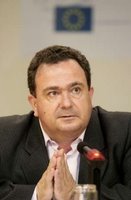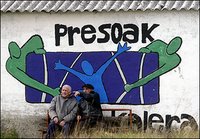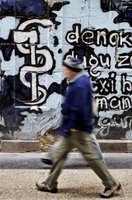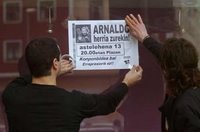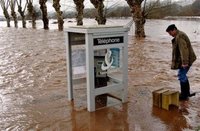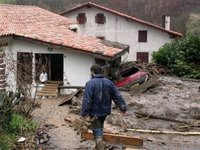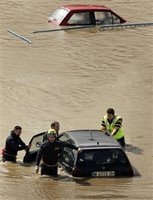"These are uncommon phenomena," the weatherman would add, and he would certainly be right. Happiness is always rare, and even more so for the Basques, with 40 years of political violence behind us.
An old proverb has it that "if the thorn doesn't scratch when it first emerges, it will never scratch." The opposite can be said of the organization those students founded: it scratched from the beginning. Already in the early 1960's, its leaders spoke of the need for active resistance against Spain's dictator, Francisco Franco, "son of Adolf and Benito."
They defined, in passing, what they meant by the word "gogortasuna," or toughness: "It means sabotage, guerrilla warfare, frequent strikes, attacks against electrical plants. That is the path we must follow, that is the path of all peoples of the world, the path of liberty." The old-fashioned nationalists who'd taken the losing side in the Spanish Civil War were out of the game as those prepared to sacrifice themselves for Euskadi — the Basque homeland — took their stand.
For several years that attitude seemed little more than swagger, since "active resistance" amounted to some graffiti and the burning of a few Spanish flags. But then, on June 7, 1968, a 23-year-old named Xabier Etxebarrieta shot and killed an officer from the Guardia Civil, Spain's military police force, who'd asked him for his identification card. Hours later, a Guardia Civil patrol ended that young militant's life.
On that particular day, some bricklayers were working on our house. One of them turned to my father and asked, "Zer gertatuko da orain?" or, "What's going to happen now?" He suspected that the event had something to do with politics, and that it would affect us all.
The dead Guardia Civil officer, José Pardines, was buried in his native Galicia after a discreet funeral. As for Xabier Etxebarrieta, he was transformed into "the first martyr of the revolution." Pamphlets distributed during the days after his death waxed eloquent about his decision to abandon a promising career as an economist in order to be "closer to the People," comparing him to Che Guevara.
What was more, they promised revenge: "As of this moment we issue a warning. For us, Txabi Etxebarrieta is worth much more than all the members of the Guardia Civil put together. They have robbed us of him and for that they will be made to pay." The pamphlets were followed by poems and songs, and the image of Etxebarrieta — a skinny kid with nerdy glasses — became as ubiquitous as a popular singer's.
Forty years later, we need no special satellite to see the underside of that heroic posturing. Now our attention is fixed on the savage attacks the ETA perpetrated at the end of the 1980's — like the one in the Hipercor supermarket in Barcelona (21 dead) or the one at the Guardia Civil barracks in Zaragoza (11 dead, among them five little girls).
But back at the beginning, almost everyone accepted a vision of ETA as a band of young idealists prepared to risk their lives to defend a homeland and a language that since the bombardment of Guernica had been victimized by Franco. When, two months after Etxebarrieta's death, another of those young idealists assassinated a police inspector, Melitón Manzanas, the Spanish left publicly celebrated, saying that a "torturer of Communists, Catholics and many other people" had passed on to a better world.
Though we forget this, or don't want to accept it, a great many political nightmares begin as a dream, a shared notion of utopia. That's what happened with the Basques.
Now, after the cease-fire, no satellite can send us a map of the future, but everyone wants to be a weatherman or a prophet. Some lovers of metaphor speak of Pandora's box and foresee great hatreds let loose. Others believe that pessimism is a sign of intelligence, and they recommend taking ETA's communiqué with many grains of salt. At the opposite extreme are those who call for a reconciliation, right this minute, between the country's two "sensibilities" — Basque nationalism and Spanish nationalism — starting with the creation of a monument that would record, together, the names of all the victims, those killed by ETA alongside ETA members killed by the police.
There are other positions, as well. Many other positions. But still and all, through the clamor of opinion, the feeling of happiness, of lightness, doesn't go away.
From my window I can see some bricklayers working on the facade of the house next door. They're talking boisterously, jumping from one scaffold to the next; they've got the radio turned up full volume. Their mood is nothing at all like that of the bricklayer who, in 1968, asked my father, "What's going to happen now?"
* Bernardo Atxaga is the author of "Obabakoak" and the forthcoming novel "The Son of the Accordion Player." This article was translated by Esther Allen from the Spanish.



